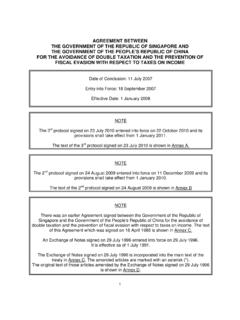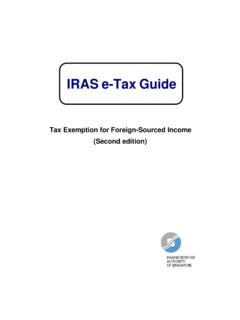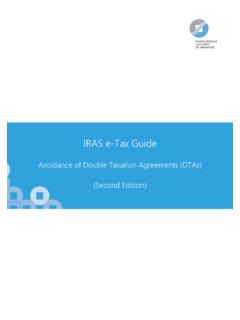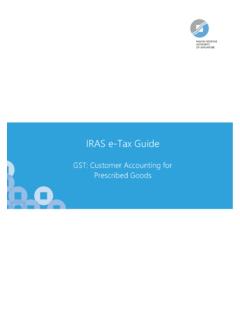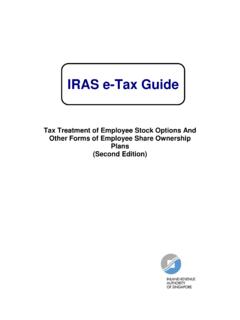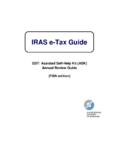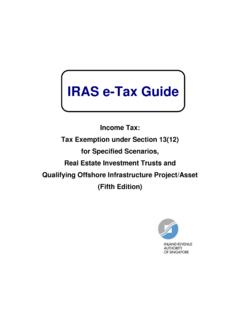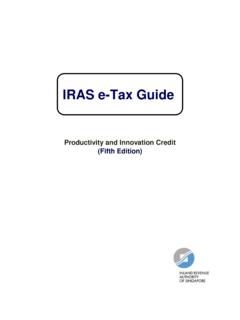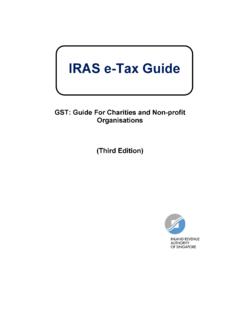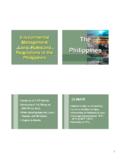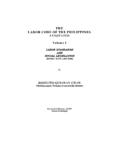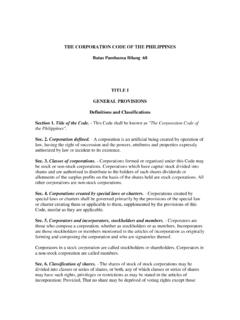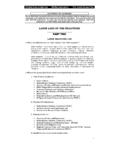Transcription of CONVENTION BETWEEN THE GOVERNMENT OF …
1 CONVENTION BETWEEN THE GOVERNMENT OF THE republic OF SINGAPORE AND THE GOVERNMENT OF THE republic OF THE PHILIPPINES FOR THE AVOIDANCE OF DOUBLE TAXATION AND THE PREVENTION OF FISCAL EVASION WITH RESPECT TO TAXES ON INCOME Date of Conclusion: 1 August 1977. Entry into Force: 18 November 1977. Effective Date: 1 January 1977. The GOVERNMENT of the republic of Singapore and the GOVERNMENT of the republic of the Philippines, Desiring to conclude a CONVENTION for the avoidance of double taxation and the prevention of fiscal evasion with respect to taxes on income, Have agreed as follows: ARTICLE 1 - PERSONAL SCOPE This CONVENTION shall apply to persons who are residents of one or both of the Contracting States. ARTICLE 2 - TAXES COVERED 1. This CONVENTION shall apply to taxes on income imposed on behalf of each Contracting State, irrespective of the manner in which they are levied.
2 2. There shall be regarded as taxes on income all taxes imposed on total income or on elements of income, including taxes on gains from the alienation of movable or immovable property and taxes on the total amounts of wages or salaries paid by enterprises. 3. The existing taxes to which the CONVENTION shall apply are in particular: (a) in the case of Singapore: the income tax (hereinafter referred to as "Singapore tax"); 1(b) in the case of the Philippines: the income taxes imposed by the GOVERNMENT of the republic of the Philippines, (hereinafter referred to as " philippine tax"). 4. The CONVENTION shall apply also to any identical or substantially similar taxes on income which are imposed after the date of signature of this CONVENTION in addition to, or in place of, the existing taxes.
3 The Competent Authorities of the Contracting States shall notify each other of the changes which have been made to their respective taxation laws. 5. The Competent Authorities of the Contracting States shall notify each other of the publication by their respective Contracting States of any material concerning the application of this CONVENTION , whether in the form of regulations, ruling, or judicial decisions by transmitting the texts of any such materials at least once a year. 6. If by reason of changes made in the taxation law of either Contracting State, it seems desirable to amend any article of this CONVENTION without affecting the general principles thereof the necessary amendments may be made by mutual consent by means of an exchange of diplomatic notes or in any other manner in accordance with their constitutional procedures.
4 ARTICLE 3 - GENERAL DEFINITIONS 1. In this CONVENTION , unless the context otherwise requires - (a) (i) the term "Singapore" means the republic of Singapore; (ii) the term "Philippines" means the republic of the Philippines and when used in a geographical sense means the national territory comprising the republic of the Philippines; (b) the terms "a Contracting State" and "the other Contracting State" mean Singapore or the Philippines, as the context requires; (c) the term "person" includes an individual, an estate, a trust, a company and any other body of persons which is treated as an entity for tax purposes; (d) the term "company" means any body corporate or any other entity which is treated as a body corporate for tax purposes; (e) the terms "enterprise of a Contracting State" and "enterprise of the other Contracting State" mean respectively an enterprise carried on by a resident of a Contracting State and an enterprise carried on by a resident of the Contracting State; (f) the term "competent authority" means: (i) in the case of Singapore, the Minister for Finance or his authorized representative; 2(ii) in the case of the Philippines, the Secretary of Finance or his authorized representative; (g) the term "tax" means Singapore tax or philippine tax as the context requires; (h) the term "national" means: (i) any individual possessing the citizenship of a Contracting State.
5 (ii) any legal person, partnership and association created, organized or incorporated under the laws of a Contracting State. (i) the term "international traffic" means any transport internationally by ship or aircraft operated by an enterprise of either Contracting State but does not include the operation of such transport solely BETWEEN places within a Contracting State. 2. As regards the application of the CONVENTION by a Contracting State any term not otherwise defined shall, unless the context otherwise requires, have the meaning which it has under the laws of that Contracting State relating to the taxes which are the subject of the CONVENTION . ARTICLE 4 - FISCAL DOMICILE 1. For the purposes of this CONVENTION , the term "resident of a Contracting State" means any person who is resident in a Contracting State for tax purposes of that Contracting State.
6 2. Where by reason of the provisions of paragraph 1 an individual is a resident of both Contracting States, then his status shall be determined, as follows: (a) He shall be deemed to be a resident of the Contracting State in which he has a permanent home available to him. If he has a permanent home available to him in both Contracting States, he shall be deemed to be a resident of the Contracting State with which his personal and economic relations are closest (hereinafter referred to as his "centre of vital interests"); (b) If the Contracting State in which he has his centre of vital interests cannot be determined, or if he has not a permanent home available to him in either Contracting State, he shall be deemed to be a resident of the Contracting State in which he has an habitual abode; (c) If he has an habitual abode in both Contracting States or in neither of them, the competent authorities of the two Contracting States shall settle the question by mutual agreement.
7 3. Where by reason of the provisions of paragraph 1, a person other than an individual is a resident of both Contracting States, he shall be deemed to be a resident of the Contracting State in which its place of effective management is situated. If its place of effective management cannot be determined, the competent authorities of the Contracting States shall settle the question by mutual agreement. 3 ARTICLE 5 - PERMANENT ESTABLISHMENT 1. For the purposes of this CONVENTION , the term "permanent establishment" means a fixed place of business in which the business of the enterprise is wholly or partly carried on. 2. The term "permanent establishment includes specially but is not limited to: (a) A seat of management; (b) A branch; (c) An office; (d) A store or other sales outlet; (e) A factory; (f) A workshop; (g) A warehouse, in relation to a person providing storage facilities for others; (h) A mine, quarry, or other place of extraction of natural resources; (i) A building site or construction or assembly project or installation project or supervisory activities in connection therewith, provided such site, project or activity continues for a period more than 183 days.
8 And (j) The furnishing of services, including consultancy services, by a resident of one of the Contracting States through employees or other personnel, provided activities of that nature continue (for the same or a connected project) within the other Contracting State for a period or periods aggregating more than 183 days. 3. Notwithstanding paragraphs 1, 2 and 4, a permanent establishment shall be deemed not to include - (a) the use of facilities solely for the purpose of storage, display or occasional delivery of goods or merchandise belonging to the enterprise; (b) the maintenance of a stock of goods or merchandise belonging to the enterprise solely for the purpose of storage, display or occasional delivery; (c) the maintenance of a stock of goods or merchandise belonging to the enterprise solely for the purpose of processing by another enterprise; (d) the maintenance of a fixed place of business solely for the purpose of purchasing goods or merchandise, or for collecting information, for the enterprise.
9 (e) the maintenance of a fixed place of business solely for the purpose of advertising, for the supply of information, for scientific research or for similar activities which have a preparatory or auxiliary character, for the enterprise. 44. A person acting in one of the Contracting States on behalf of an enterprise of the other Contracting State, other than an agent of an independent status to whom paragraph 5 applies, shall be deemed to be a permanent establishment in the first-mentioned Contracting State if - (a) he has, and habitually exercises in the first-mentioned Contracting State, an authority to conclude contracts in the name of that enterprise unless the exercise of such authority is limited to the purchase of goods or merchandise for that enterprise; or (b) he has no such authority, but habitually maintains in the first-mentioned State a stock of goods or merchandise from which he regularly delivers goods or merchandise on behalf of the enterprise.
10 5. An enterprise of one of the Contracting States shall not be deemed to have a permanent establishment in the other Contracting State merely because that enterprise carries on business in that other Contracting State through a broker, general commission agent, or any other agent of an independent status, where such broker or agent is acting in the ordinary course of his business. However, when the activities of such an agent are devoted wholly or almost wholly on behalf of that enterprise, he shall not be considered an agent of independent status within the meaning of this paragraph if the transactions BETWEEN the agent and the enterprise were not made under arm's length conditions. 6. Except with respect to reinsurance, an enterprise of a Contracting State shall be deemed to have a permanent establishment in the other Contracting State if it collects premiums in that other State, or insures risks situated therein, through an employee or representative situated therein who is not an agent of independent status to whom paragraph 5 applies.
